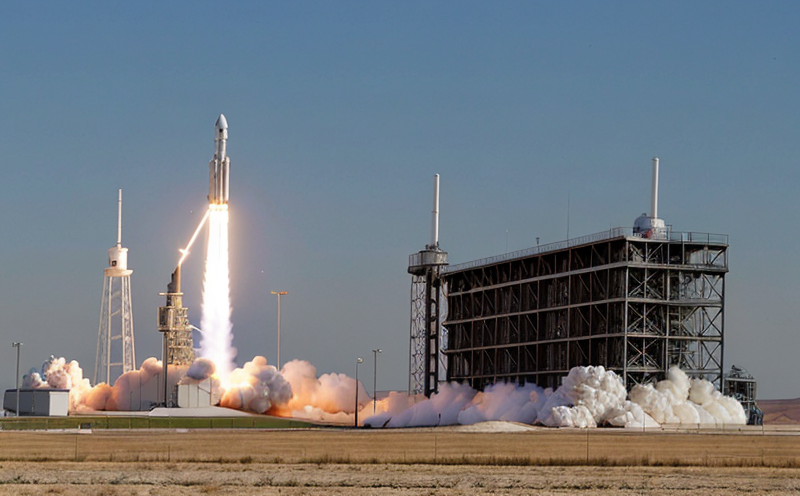
-
Aviation and Aerospace Testing-
Aerospace Propulsion Systems Testing-
Testing Rocket Engine Efficiency in Variable Conditions
We provide comprehensive solutions designed to help our clients mitigate risks, enhance performance, and excel in key areas such as quality, health & safety, environmental sustainability, and social responsibility.
Discover
For many years, our organization has been operating successfully, boasting modern laboratories that meet international standards. These laboratories are equipped with the latest technology devices and equipment, and we have built a strong team of experienced and trained personnel to operate them.
DiscoverWelcome to Eurolab, your partner in pioneering solutions that encompass every facet of life. We are committed to delivering comprehensive Assurance, Testing, Inspection, and Certification services, empowering our global clientele with the ultimate confidence in their products and processes.
Discover
-
Aviation and Aerospace Testing-
Aerospace Propulsion Systems Testing-
Testing Rocket Engine Efficiency in Variable ConditionsTesting Rocket Engine Efficiency in Variable Conditions
Rocket engines are a critical component of space exploration, responsible for propelling spacecraft to their destinations at incredible speeds. However, testing rocket engine efficiency in variable conditions poses significant challenges. The performance of a rocket engine can be affected by numerous factors such as temperature, pressure, and altitude, making it essential to understand how the engine responds to different environmental conditions.
Understanding Rocket Engine Efficiency
Rocket engine efficiency is typically measured in terms of specific impulse (Isp), which represents the amount of thrust produced per unit of propellant consumed. Isp is a crucial metric for evaluating rocket engine performance, as it directly affects the mission duration and payload capacity. However, testing rocket engines under various conditions requires specialized facilities and equipment.
Challenges in Testing Rocket Engine Efficiency
Several challenges must be considered when testing rocket engine efficiency:
Specific impulse (Isp) measures the amount of thrust produced per unit of propellant consumed. It directly affects mission duration and payload capacity.
2. How do temperature extremes affect rocket engine efficiency?
Temperature affects engine materials, fuel properties, and combustion dynamics, leading to variations in Isp and thrust-to-weight ratio.
3. What is the significance of altitude and pressure on rocket engine performance?
Altitude affects air density and pressure, impacting combustion efficiency, Isp, and thrust-to-weight ratio.
4. How can testing be conducted under variable conditions to ensure accurate results?
Facilities with temperature-controlled chambers or altitude simulation capabilities are needed for testing rocket engines under various conditions.
Testing rocket engine efficiency in variable conditions is crucial for ensuring reliable performance during space missions. Understanding the effects of temperature extremes, altitude, and pressure on engine components and combustion dynamics helps engineers optimize designs and select suitable materials for different operational environments.

Agricultural Equipment Certification
Agricultural equipment certification is a process that ensures agricultural machinery meets specific...

Construction and Engineering Compliance
Construction and Engineering Compliance: Ensuring Safety, Quality, and Regulatory Adherence In the ...

Healthcare and Medical Devices
The Evolution of Healthcare and Medical Devices: Trends, Innovations, and Challenges The healthcare...

Trade and Government Regulations
Trade and government regulations play a vital role in shaping the global economy. These regulations ...

Railway Industry Compliance
Railway Industry Compliance: Ensuring Safety and Efficiency The railway industry is a critical comp...

Lighting and Optical Device Testing
Lighting and Optical Device Testing: Ensuring Performance and Safety Lighting and optical devices a...

Renewable Energy Testing and Standards
Renewable Energy Testing and Standards: Ensuring a Sustainable Future The world is rapidly transiti...

Consumer Product Safety
Consumer Product Safety: Protecting Consumers from Harmful Products As a consumer, you have the rig...

Pharmaceutical Compliance
Pharmaceutical compliance refers to the adherence of pharmaceutical companies and organizations to l...

Fire Safety and Prevention Standards
Fire Safety and Prevention Standards: Protecting Lives and Property Fire safety and prevention stan...

Environmental Impact Assessment
Environmental Impact Assessment: A Comprehensive Guide Environmental Impact Assessment (EIA) is a c...

Energy and Sustainability Standards
In today’s rapidly evolving world, businesses face increasing pressure to meet global energy a...

Electromechanical Safety Certification
Electromechanical Safety Certification: Ensuring Compliance and Protecting Lives In todays intercon...

Food Safety and Testing
Food Safety and Testing: Ensuring the Quality of Our Food As consumers, we expect our food to be sa...

Transportation and Logistics Certification
Transportation and Logistics Certification: A Comprehensive Guide The transportation and logistics ...

Product and Retail Standards
Product and Retail Standards: Ensuring Quality and Safety for Consumers In todays competitive marke...

Environmental Simulation Testing
Environmental Simulation Testing: A Comprehensive Guide In todays world, where technology is rapidl...

Automotive Compliance and Certification
Automotive Compliance and Certification: Ensuring Safety and Efficiency The automotive industry is ...

Electrical and Electromagnetic Testing
Electrical and Electromagnetic Testing: A Comprehensive Guide Introduction Electrical and electrom...

Aviation and Aerospace Testing
Aviation and Aerospace Testing: Ensuring Safety and Efficiency The aviation and aerospace industr...

Hospitality and Tourism Certification
Hospitality and Tourism Certification: Unlocking Opportunities in the Industry The hospitality and ...

Industrial Equipment Certification
Industrial equipment certification is a critical process that ensures industrial equipment meets spe...

Chemical Safety and Certification
Chemical safety and certification are critical in ensuring the safe management of products and proce...

NEBS and Telecommunication Standards
Network Equipment Building System (NEBS) and Telecommunication Standards The Network Equipment Bu...

MDR Testing and Compliance
MDR Testing and Compliance: A Comprehensive Guide The Medical Device Regulation (MDR) is a comprehe...

Military Equipment Standards
Military Equipment Standards: Ensuring Effectiveness and Safety The use of military equipment is a ...

Battery Testing and Safety
Battery Testing and Safety: A Comprehensive Guide As technology continues to advance, battery-power...

Pressure Vessels and Installations Testing
Pressure Vessels and Installations Testing Pressure vessels are a critical component of various ind...

IT and Data Center Certification
IT and Data Center Certification: Understanding the Importance and Benefits The field of Informatio...

Cosmetic Product Testing
The Complex World of Cosmetic Product Testing The cosmetics industry is a multi-billion-dollar ma...